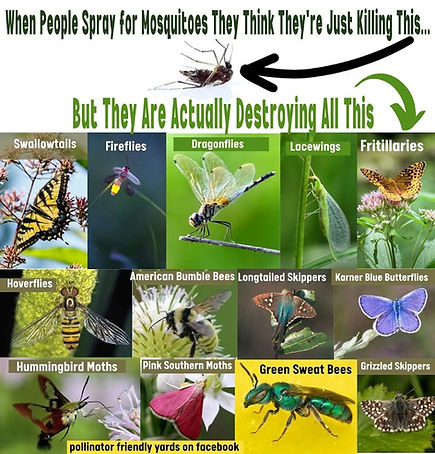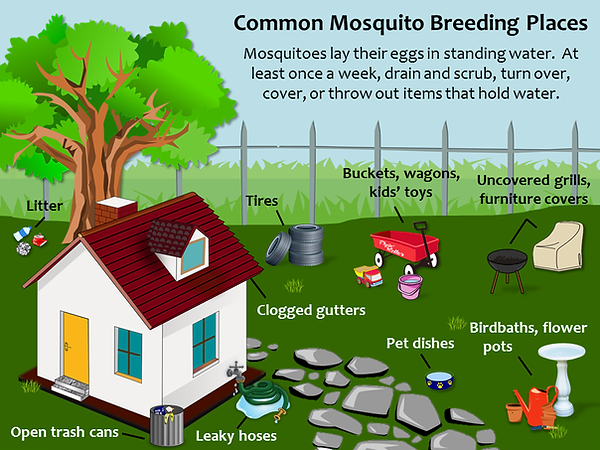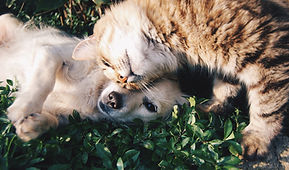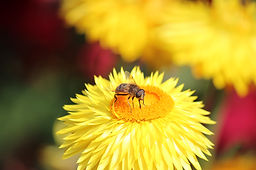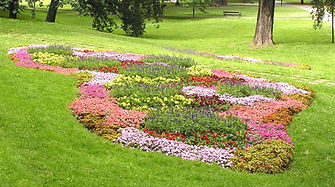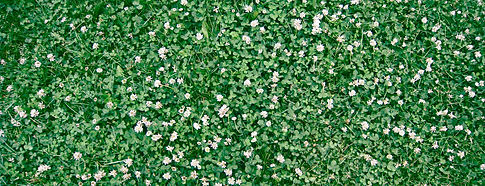Non-toxic yard care = protecting people, pets, pollinators, and planet!

On July 22 2025, Montclair Town Council adopted an ordinance (Ord. No. O-25-22) prohibiting the use of synthetic pesticides on township-owned land. This ordinance formalizes the township's practices that sustain healthy, green, non-toxic fields, lawns, parks and open spaces.
Residents can mirror these practices at home and support public, environmental, and ecological health!
Frequently Asked Questions
What are synthetic pesticides?
Synthetic pesticides are man-made chemical substances designed to kill, repel, or control what some label as "pests", such as insects, weeds, fungi, rodents, or bacteria. They are typically created in laboratories through industrial chemical processes, using compounds not naturally found in the environment, unlike natural or organic pesticides (i.e. things like vinegar & water).
In a municipality or home, if used, they are applied to lawns, fields, and gardens. Typically people apply pesticides because they want to reduce “weeds*” and mosquitos. They may not realize there are safer alternatives.
*The term "weeds" may be used to label plants like dandelion and clover. However, these plants are actually very beneficial to soil health, pollinators and beneficial insects. If we can adjust our mindset a bit, we can start to appreciate these plants rather than vilify them.
Why should I be concerned about pesticides used on lawns?
Synthetic pesticides can pose serious risks to human health, the environment, beneficial insects, birds, and other wildlife.
How do lawn pesticides affect human health?
Exposure to lawn pesticides—especially among children—has been linked to:
-
Asthma and respiratory problems
-
Attention disorders and developmental delays
-
Increased risk of certain cancers, including childhood leukemia
-
Hormonal and nervous system disruptions with long-term exposure
Children, pregnant women, and those with pre-existing health conditions can be especially vulnerable.
Learn more here.
Are pets at risk if you use lawn pesticides?
Dogs and cats can absorb pesticides through their paws or by licking treated grass. Exposure may lead to:
-
Vomiting and seizures
-
Skin rashes and eye irritation
-
Increased risk of cancers, such as bladder cancer in dogs
What impact do pesticides have on the environment?
Pesticides don’t stay where they’re applied. They can:
-
Run off into streams, lakes, and groundwater, polluting drinking water
-
Harm fish and aquatic life
-
Volatilize into the air and contribute to pollution
-
Disrupt the balance of soil ecosystems
PFAS (per- and polyfluoroalkyl substances) are also found in pesticides. The Pesticide Action & Agroecology Network explains, "these chemicals are persistent and slow to break down in the environment, making them a public health concern due to the many negative health effects associated with PFAS exposure."
How do pesticides affect pollinators and other wildlife?
Pesticides—especially neonicotinoids—are harmful to bees, butterflies, and birds. They can:
-
Disrupt navigation and reproduction in pollinators
-
Kill beneficial insects
-
Poison birds and small mammals either directly or through their food sources
Don’t lawn pesticides break down quickly?
Some pesticides break down relatively fast, but many persist in the soil and water for weeks or months. Their breakdown products can also be toxic. Repeated applications can cause cumulative harm.
Can "pests" become resistant to lawn pesticides?
Yes. Overuse can lead to pesticide-resistant weeds/plants and insects. This creates a cycle of escalating chemical use, which is both costly and environmentally damaging.
What should you do if you want to reduce "weeds" in your yard?
First off, why get rid of them? Weeds really are just plants that we perceive to be undesirable, but which have a lot of advantages to pollinators and soil health.
Let's change the narrative!! A little history...
-
During WWII, the U.S. developed and mass-produced synthetic chemicals for warfare — including insecticides and herbicides like DDT.
-
After the war, these chemicals were repurposed for civilian use, especially in agriculture and home pest control.
-
Chemical companies marketed them as modern miracles for keeping lawns green and pest-free.
-
The 1950s housing boom (e.g., Levittown-style developments) brought millions of families to new suburban neighborhoods.
-
Lawn care became part of the American Dream, and chemical companies capitalized on this cultural shift.
This grass monoculture approach has caused damage to our eco-systems and puts people, pets and wildlife at risk. It is not worth the risk. Why can’t the ideal lawn be made up of a mixture of grass, clover, dandelions and other interesting plants? Why do we get so stuck on a lawn that is a monoculture of grass only? With just a slight shift in mindset we can have lawns that are green, healthy, and home to a variety of plants.
More and more folks are actually planting these plants in their lawns to support healthy ecologies and because they grow attractive flowers. (Did you know that dandelions are highly nutritious while providing food for over 200 insect species. These insects include bees, butterflies, moths, and various types of flies and beetles. Clover can act as a natural fertilizer by fixing nitrogen in the soil, suppressing weeds, and improving soil structure.)
What are safer, healthier alternatives?
1) Organic lawn care: Avoids synthetic chemicals, focuses on soil health and native plants instead. Find a landscaper who supports organic lawn care, or do it yourself!
The best way to have a lush lawn is to ensure you have healthy soil. The problem is that lawn chemicals do just the opposite. They kill the microbiology in the soil which means plants don’t live well.
Enrich your soil with things like compost tea, organic fertilizer, left over grass clippings and seed heavily in the fall and spring. Incorporate clover which adds nitrogen to your soil, and is drought resistant. Learn to appreciate dandelions for what they are -- pretty flowers that happen to be highly beneficial to pollinators.
If you absolutely must reduce some weeds (=undesirable plant), hand-pull them or spot-treat with natural products like vinegar-based sprays. Here is a great resource.
2) Native landscaping: Better yet, reduce your lawn, plant a pretty native garden or keep a portion of your yard wild, and help all kinds of beneficial insects and birds.
Tips - feeding birds & purchasing plants without pesticides:
>> If feeding birds through a backyard feeder, do your research -- make sure the seeds/feed had not been treated with pesticides (most likely neonicotinoid insecticides) prior to or during manufacturing.
>> If purchasing plants in nurseries, do your research -- make sure they were not treated with insecticides or other pesticides while growing.
What about mosquitos? Want to get rid of mosquitos?
No one can argue with that. However, mosquito treatments are often marketed to homeowners as a quick solution to mosquito problems. Foggers release fine chemical mists over yards, gardens, and patios — usually using synthetic insecticides like pyrethroids. While fogging may provide temporary relief, it comes with serious trade-offs as the spray can also create a risk to health, ecosystems, and biodiversity. By investing in long-term, eco-friendly mosquito control strategies, individuals and communities can protect themselves without endangering the environment. If you do work with a mosquito spraying company, ask them to send you the MSDS sheet for the products they are using. This sheet lists the active ingredients in the products. You can read about the potential negative health and environmental impacts of these chemicals here and here.
Why isn't mosquito fogging a long-term fix?
Fogging only kills adult mosquitoes on contact — usually just a fraction of the population. Mosquitoes quickly return unless breeding grounds (like standing water) are removed.
And, over time, mosquitoes can develop resistance to fogging chemicals, making treatments less effective and increasing the need for stronger pesticides.
What are safer and more effective ways to reduce mosquitoes without harming your health or yard?
What are other non-toxic ways to reduce mosquitos besides eliminating standing water?
The key is to kill the larvae before they can become adults!
✅ Use Mosquito Dunks or Larvicides
-
These kill mosquito larvae in standing water and are safe for pets, birds, and beneficial insects.
✅ Plant Natural Repellents
-
Lemongrass, marigolds, lavender, and citronella naturally discourage mosquitoes.
✅ Encourage Natural Predators
-
Dragonflies, bats, and certain birds eat large numbers of mosquitoes.
✅ Install Fans and Screens
-
Mosquitoes are weak fliers. Fans on patios and screened-in porches can reduce bites without chemicals.
